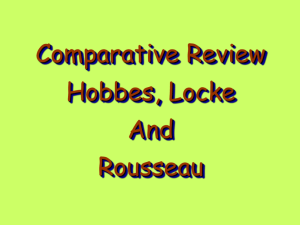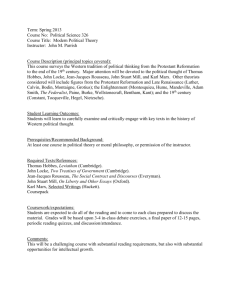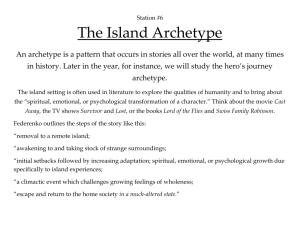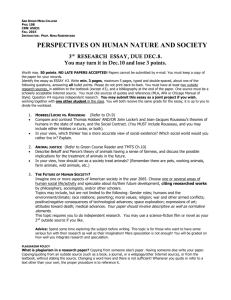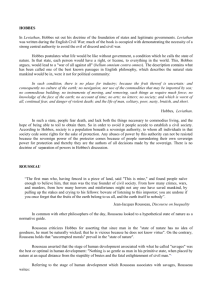Hobbes and Rousseau - internationalpoliticaltheory
advertisement
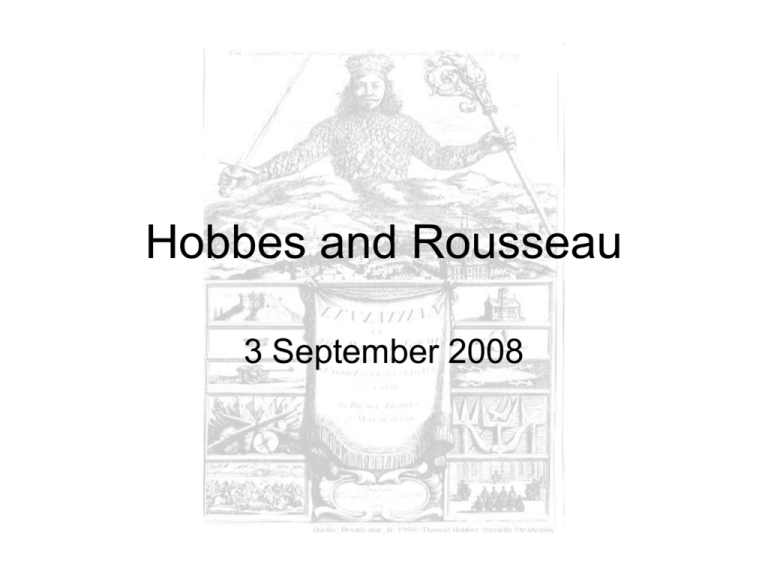
Hobbes and Rousseau 3 September 2008 Hobbes’ approach to conflict • Where does conflict come from, for Hobbes? – Desire to preserve your life plus – Rationality plus – Lack of a sovereign authority Hobbes’ approach to conflict • How does conflict get resolved, according to Hobbes? – The conflicting parties agree to a sovereign Hobbes’ approach to conflict • The reasoning of the parties – It is better for each of us individually that there be a sovereign. – It is relatively unimportant, however, who that sovereign is. – But once we agree on such a sovereign, we realize that it is no longer rational for us not to promise to restrain ourselves, and it is no longer rational to disagree on the sovereign – Peace endures so long as we agree on the sovereign Hobbes’ approach to conflict • The civil state is always better than the state of nature; any form of government is better than no government Rousseau’s approach to conflict • What are human beings naturally like, for Rousseau? – They desire to preserve themselves – But they are not calculating machines – And they have an aversion to killing – They are also naturally independent, and love their independence Rousseau’s approach to conflict • Are human beings naturally in conflict? – No: if we assume that originally human beings were few and widely scattered, Rousseau’s assumptions imply no great degree of conflict Rousseau’s approach to conflict • So where does conflict come from if it is not natural? – Not the desire to preserve oneself, but the comparative passion of amour propre – The development of rationality in the service of amour propre – The smothering of the aversion to killing – The loss of natural independence and the development of inequality Amour propre vs. amour de soi • Amour de soi: the natural self-love of man for his own existence. • Amour propre: the self-love of man in comparison to others • Amour propre is only possible when we have become interdependent and can no longer live without many others The development of rationality • The progress of our rationality depends on increasing interdependence (e.g., language) • Yet the progress of our rationality outruns our moral progress: “morals become corrupted as minds become more enlightened” The aversion to killing • One has to become cruel; it does not normally happen overnight • One of the most effective means of muting the aversion to killing is group solidarity (e.g., nationalism) The loss of natural independence • We naturally love independence, not being in the power of another: this is freedom • Interdependence destroys freedom by creating social inequality, and hence fosters conflict • Our natural love of independence prevents the Hobbesian solution as well Rousseau’s approach to conflict • Conflict is ultimately the result, not of equality and our natural desires, but of inequality and our socialized desires, which come from the formation of society • In sum, conflict is a result of injustice The development of the civil state • Primary state of nature: total independence, scattered human beings, no conflict The development of the civil state • Population pressures lead to: small, more or less stateless bands of relatively independent individuals (e.g., the Caribs). – First development of “comparative” passions and the conflicts attendant on it The development of the civil state • The invention of property leads to widespread conflict between rich and poor in a stateless context: the Hobbessian “state of nature.” The development of the civil state • The state is an invention of the rich, who benefit the most from it – It prevents some of the horrid conflict of the previous stage – But all of these original states are quite imperfect and unjust, and though people tried to make them better occasionally, they mostly degenerated into tyrannies The development of the social state • “Well versed in my duties and happiness, I shut my book, leave the classroom, and look around me. I see unfortunate nations groaning under yokes of iron, the human race crushed by a handful of oppressors, a starving crowd overwhelmed with pain and hunger, whose blood and tears the rich drink in peace, and everywhere the strong armed against the weak with the formidable power of the law” The development of the civil state • Yet the state externalizes conflict: – Once one society is formed, others must form too – But states, unlike individuals, are not naturally equal, and are placed in close connections with one another – Their power is thus relative to the power of other states – Moreover, states are vigorous to the extent they generate internal solidarity – But internal solidarity can destroy the aversion to killing members of other groups The development of the state • “War comes from peace”, i.e., from the development of states • War is thus endemic in the international system Rousseau’s approach to conflict • How can conflict be resolved, then? – Returning to the state of nature (generally impossible) – More perfectly socializing ourselves: creating a just society that replicates natural independence through dependence on the laws, and creating a federation of such societies (also terribly difficult) Countervailing tendencies • Is there any hope? – Nature is not entirely suppressed; it can never be entirely extinguished • Human beings generally still love independence (freedom) • Human beings generally still find it hard to kill and they abhor killing What would a just society look like? • Eliminates all personal dependence and substitutes for it a dependence on the law: the rule of law • Socializes us into becoming citizens, not having a private will distinct from the general will • It is also small and not faced with great external dangers or the temptation to conquer Who is right, Hobbes or Rousseau?
